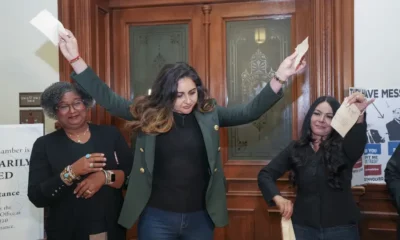News from the South - Alabama News Feed
News 5 NOW at 12:30pm 07/09/2025
SUMMARY: News5 Now on July 9 reports several key stories: The First Alert Storm Team is helping prepare for an approaching hurricane, offering free weather radio programming in Mobile. Tracy Walker, a teacher charged with giving alcohol to a 4-year-old student, is allowed to go on a planned Bahamas vacation under ankle monitor supervision. Baldwin County police are searching for missing woman Bonnie Kazar. Gulf Coast airports, including Pensacola and Mobile, end the shoes-off policy at security checkpoints. In Texas, over 160 people remain missing after devastating floods, including a local family and Camp Mystic campers. Viewers are encouraged to share their flood emergency plans and opinions on TSA policy changes.
Learn how our First Alert Storm Team can help ensure you’re ready for a hurricane, a teacher accused of giving a student alcohol …
News from the South - Alabama News Feed
Appeals court backs Venezuelan migrants’ effort to keep protected status
by Ariana Figueroa, Alabama Reflector
August 29, 2025
WASHINGTON — A three-judge panel of a federal appeals court unanimously ruled Friday the Trump administration likely acted unlawfully when it revoked extensions for temporary protections for more than 600,000 Venezuelans.
The U.S. Court of Appeals for the 9th Circuit panel agreed with the U.S. District Court for the Northern District of California’s March decision to block Homeland Security Secretary Kristi Noem’s decision to vacate two extensions of Temporary Protected Status, or TPS, to the group until October 2026 that the Biden administration put in place early this year.
One of the groups of Venezuelans had their TPS expire in April and the second is set to expire in September. The three-judge panel found that the Trump administration’s decision to end TPS in April is also likely unlawful.
The panel said Noem did not have the authority to revoke the TPS extensions granted by then-DHS Secretary Alejandro Mayorkas.
Judges Kim McLane Wardlaw, appointed by former President Bill Clinton, Salvador Mendoza Jr. and Anthony Johnstone, who were both appointed by former President Joe Biden, reached the decision.
The judges ruled that the law creating TPS, which grants work visas and deportation protections to nationals from a country deemed too dangerous to return to, was designed to create “predictable periods of safety and legal status for TPS beneficiaries” and the administration’s cancellation of the extension contradicted that goal.
“Sudden reversals of prior decisions contravene the statute’s plain language and purpose,” they wrote. “Here, hundreds of thousands of people have been stripped of status and plunged into uncertainty. The stability of TPS has been replaced by fears of family separation, detention, and deportation.”
“Congress did not contemplate this, and the ongoing irreparable harm to Plaintiffs warrants a remedy pending a final adjudication on the merits,” they continued.
A spokesperson for DHS did not return a message seeking comment Friday.
The U.S. Supreme Court allowed the Trump administration in May to end TPS for the group of 350,000 Venezuelans that expired in April. It is unclear how Friday’s order will affect that group.
The roughly 250,000 Venezuelans in another group are set to have their TPS expire Sept. 10 after the DHS revoked the extension.
Alabama Reflector is part of States Newsroom, a nonprofit news network supported by grants and a coalition of donors as a 501c(3) public charity. Alabama Reflector maintains editorial independence. Contact Editor Brian Lyman for questions: info@alabamareflector.com.
The post Appeals court backs Venezuelan migrants’ effort to keep protected status appeared first on alabamareflector.com
Note: The following A.I. based commentary is not part of the original article, reproduced above, but is offered in the hopes that it will promote greater media literacy and critical thinking, by making any potential bias more visible to the reader –Staff Editor.
Political Bias Rating: Center-Left
This content presents a legal and policy issue involving the Trump administration and the Trump-era Homeland Security Secretary Kristi Noem in a critical light, highlighting judicial decisions that deem actions taken under their leadership as likely unlawful. The article cites judges appointed by both Democratic and Republican presidents but emphasizes the ruling’s alignment with protections associated with the Biden administration’s policies. The framing tends to support immigration protections and criticizes the rollback efforts, which reflects a center-left perspective commonly supportive of immigrant rights and skeptical of Trump administration policies. However, the piece maintains a factual tone without overt opinion or partisan language, keeping it relatively balanced but leaning slightly to the left.
News from the South - Alabama News Feed
News 5 NOW at 8:00am August 29th, 2025
SUMMARY: On August 29, 2025, News 5 NOW covered major stories including the 20th anniversary of Hurricane Katrina, highlighting its catastrophic impact with over 1,800 deaths and $200 billion in damages. A family shared their experience living in New Orleans during the storm. The news also reported a deadly Russian drone attack in Ukraine, Claire’s closing nearly 300 stores including one in Foley, and Foley’s upcoming drainage project on US 98. Mobile County introduced 20 locations for US flag disposal. The show featured a poll on Alabama’s school cell phone ban, revealing mixed opinions. Viewers were reminded to expect busy Labor Day weekend traffic and possible rain.
Local News, Weather, Traffic, Sports, Questoin of the Day, Poll of the Day
News from the South - Alabama News Feed
Josiah Catches Up With Jose and Ozzie Canseco | Aug. 28, 2025 | News 19 at 6 p.m.
SUMMARY: At Toyota Field, baseball legend Jose Canseco and his brother Ozzie reunited with Josiah to celebrate their impact on the team. Jose reflected on his time playing in Huntsville, recalling supportive fans and the transition from the old ballpark to the new one. He shared memories of his successful seasons, including winning the Southern League MVP in 1985 after just 57 games and helping secure a championship. Jose also discussed his favorite pitchers to face, particularly knuckleballers, which he excelled against due to his softball background. The Canseco brothers remain celebrated figures for their significant contributions to the team’s history.
News 19’s Josiah Elmore catches up with Jose and Ozzie Canseco
News 19 is North Alabama’s News Leader! We are the CBS affiliate in North Alabama and the Tennessee Valley since November 28, 1963.
https://whnt.com/
https://www.facebook.com/whntnews19
https://www.instagram.com/whntnews19/
https://twitter.com/whnt
-
News from the South - Texas News Feed5 days ago
Racism Wrapped in Rural Warmth
-
News from the South - Missouri News Feed6 days ago
Donors to private school voucher program removed from Missouri transparency site
-
News from the South - Alabama News Feed6 days ago
Child in north Alabama has measles, says Alabama Department of Public Health
-
News from the South - Texas News Feed6 days ago
Texas Democrats’ walkout prompts GOP retribution
-
News from the South - Missouri News Feed6 days ago
New Missouri law means state is no longer allowed to seize assets of prison inmates
-
News from the South - Tennessee News Feed6 days ago
A marsh bird found in Tennessee wetlands is endangered. FWS is drafting a plan.
-
News from the South - Alabama News Feed7 days ago
Wilsonville residents seek preemptive strike against massive data center project
-
News from the South - Georgia News Feed6 days ago
Voters head to the polls to pick new metro Atlanta state senator in low-turnout special election











































